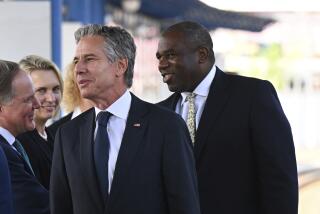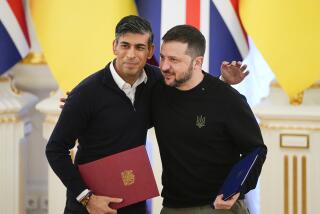Britain to Share Gulf Tab : Iraq Renews Its Call for a Holy War
- Share via
Britain today pledged to help share the cost of the Persian Gulf campaign against Iraq, the first Western ally to do so, as Treasury Secretary Nicholas F. Brady continued his global fund-raising effort.
Prime Minister Margaret Thatcher promised to contribute to the U.S.-organized fund but offered no specific amount, a spokeswoman said.
“She said the United Kingdom would certainly contribute . . . and would let the United States have detailed figures as soon as possible,” the spokeswoman said.
As she spoke, Iraqi leader Saddam Hussein, in his latest televised message, said children in Iraq are dying because of the U.N. embargo.
“The children in Iraq are dying because of a foolish decision taken by certain people, the children of Iraq are dying because they are being deprived of their food and milk and medicine,” Saddam said in a statement read by an announcer.
He also sounded a defiant note, urging Arabs to rise up and overthrow leaders in countries aligned against him. He singled out Saudi Arabia and Egypt.
Meanwhile, Secretary of State James A. Baker III headed for the Middle East for discussions with oil-rich countries in the region on increasing their contributions to the offensive.
The Administration is seeking more than $25 billion to help defray the $1-billion-a-month expense of the American troop deployment in the Persian Gulf and to aid nations facing economic hardships from the trade embargo against Iraq.
Brady told reporters after his 45-minute meeting at 10 Downing Street that he was pleased with Thatcher’s response.
He rejected suggestions by reporters that foreign leaders might resent being leaned on by the United States to provide more financial support.
“Quite the contrary,” Brady said. “Mrs. Thatcher thought it was exactly the right thing to do.”
Brady said the French had also been supportive.
More Westerners who had been stranded in Iraq after the Aug. 2 invasion of Kuwait flew home to freedom today, and Baghdad insisted that it is speeding the departure of those who remain behind.
U.S. military officials said the United States is using night convoys to move heavy firepower into the northern Saudi desert. The moves increase the offensive capabilities of U.S. forces facing Iraq, although officials have said the buildup is designed to defend the Saudis against any Iraqi attack.
In Washington before leaving for the Middle East, Baker told Congress that some air supplies are reaching Iraq despite the U.N. embargo and he raised the prospect of an air blockade if the leakage became significant.
Testifying before the Senate Foreign Relations Committee, the secretary of state said that Washington does not believe that air supplies could meet Iraqi needs and that the sanction-busting so far had not been significant.
Baker said that if a U.N. sanctions committee could not take effective action, the United States would have the option of seeking U.N. approval for an air blockade.
“We have never sought interdiction or interception authority from the Security Council with respect to air transport because it is our view that Iraq cannot supply itself solely from the air,” he said. “But it is something we are watching.”
More to Read
Sign up for Essential California
The most important California stories and recommendations in your inbox every morning.
You may occasionally receive promotional content from the Los Angeles Times.













